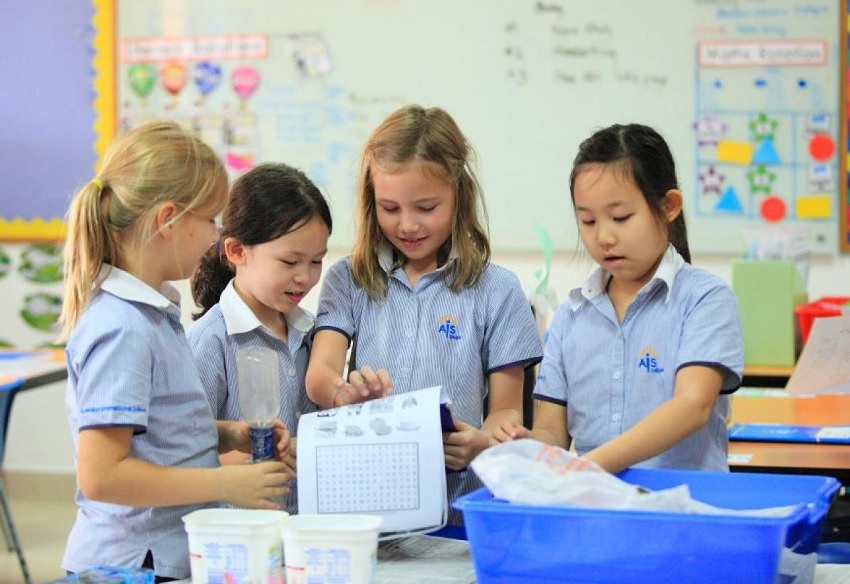Parents braced for fresh tuition hit
 |
| Parents braced for fresh tuition hit - illustration photo/ Source: aisvietnam.com |
For the 2022-2023 academic year, most international schools will increase their tuition fees by an average of $870 per year. Fees range from $4,350-13,000 per year for the pre-school level, $6,500-21,700 for primary schools, and $8,700-30,400 for high schools.
The biggest leap was recorded at International School Ho Chi Minh City. Last school year, tuition for grades 11 and 12 was $35,700 per year. In 2022-2023, they have skyrocketed to a record of nearly $37,900 per year each, an increase of well over $2,000.
At the Australian International School, upcoming fees are the highest for grade 12, at $31,900 per year. Compared to the previous school year, fees have risen over $1,500. At the International School of North America, costs have ballooned by around $1,400 depending on the grade level.
Aside from fully international schools, some bilingual institutions that offer Cambridge programmes have reported increases. For example, the British-Vietnamese International School set fees that are $870-1,300 higher than in 2021-2022.
These tuition fees apply only if parents pay a lump sum for the whole year. For early bird payments, parents often get a small discount of 3-5 per cent. If paying by term or quarter in 2-4 instalments, parents have to pay a higher rate for each.
Tuition raises have been a normal practice at the 13 fully foreign-funded international schools in Hanoi and the 20 equivalent institutions in Ho Chi Minh City. However, while public education institutions follow the Ministry of Education and Training’s tuition roadmap with an average increase of about 8 per cent per academic year, depending on each training programme, international schools operate on the principle of financial autonomy and self-balancing of revenues and expenditure.
Therefore, these schools can adjust tuition fees at will, based on the free market model.
On the other hand, according to the CFO of one international school in Hanoi, although the school has full autonomy over its tuition fees, the problem of revenues and costs is a tough one. Any tuition rate increases are based on market price, the school’s investment level, breakthroughs in curricula, investment in facilities, and salary for teachers and staff. Over the past few years, human resources have been a challenge for most international schools, since a number of foreign teachers have gone back to their home countries.
“It will take some time for us to recover in terms of human resources and profit and loss management,” the CFO commented.
International schools in general also have their own tuition policy. A source from another international school in District 7 of Ho Chi Minh City revealed that each year, there will be a progressive increase of no more than 10 per cent compared to the previous year’s tuition, unless there is an economic crisis that causes a price slip of more than 10 per cent. The actual ratio is decided carefully considering the interests of the market and the overall purchase power of targeted parents.
Despite the dramatic tuition rise, a portion of the Vietnamese upper-middle-class is still interested in the segment. Chau Trinh, a parent of one student at British International School Hanoi, told VIR, “While tuition fees at international schools are significantly higher than most other choices, I’m willing to pay for my child to have access to an international teaching style while remaining in proximity with the family. Also, when she graduates, it will be easier for her to apply to universities abroad.”
Thanh Nguyen, a parent of a student at the Vietnam Australia International School, said that the lack of regulations or standards for such increases is a major concern for parents like him. “Since there is no ceiling, the school can increase as much as it wants. For new parents, if they think the price is unreasonable, they can choose not to submit an application. But returning parents have little choice because it’s important for children to have consistency in their education and social circle. For me personally, it’s even a harder decision to move my child from her familiar environment, so I have to accept it,” Thanh said.
As the demand continues, the already competitive market for international schools in Vietnam continues to expand. This has been exacerbated by developments in China last year when it made the Chinese national curriculum mandatory for international schools. Now, more foreign educational investors see Vietnam as a high-potential market.
From August, educational developer Embassy Education Vietnam and North London Collegiate School from the United Kingdom will launch the Vietnam Tinh Hoa Primary School in Ho Chi Minh City. Scotch College in Australia has also opened its Scotch AGS School in Ho Chi Minh City, enrolling students for the new academic year. Many other international names are expected to soon come into operation, such as Brighton College (Hanoi), Marianapolis (Dong Nai), and Uppingham College (Ho Chi Minh City).
What the stars mean:
★ Poor ★ ★ Promising ★★★ Good ★★★★ Very good ★★★★★ Exceptional
Related Contents
Latest News
More News
- Vietnam sets ambitious dairy growth targets (February 24, 2026 | 18:00)
- Masan Consumer names new deputy CEO to drive foods and beverages growth (February 23, 2026 | 20:52)
- Myriad risks ahead, but ones Vietnam can confront (February 20, 2026 | 15:02)
- Vietnam making the leap into AI and semiconductors (February 20, 2026 | 09:37)
- Funding must be activated for semiconductor success (February 20, 2026 | 09:20)
- Resilience as new benchmark for smarter infrastructure (February 19, 2026 | 20:35)
- A golden time to shine within ASEAN (February 19, 2026 | 20:22)
- Vietnam’s pivotal year for advancing sustainability (February 19, 2026 | 08:44)
- Strengthening the core role of industry and trade (February 19, 2026 | 08:35)
- Future orientations for healthcare improvements (February 19, 2026 | 08:29)

 Tag:
Tag:



















 Mobile Version
Mobile Version